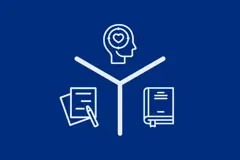Company secretaries and governance professionals apply and share their technical, strategic and commercial knowledge through good practice. This is done across a broad range of activities that support the board in creating systemic change, assessing shareholder and stakeholder interests, and balancing short-term performance with the long-term stability of the organisation.
Good governance involves keeping abreast of good practices, technological developments and changes in the political, social, legal, regulatory and commercial environment. One of the most important attributes for company secretaries and governance professionals in the 'practice' competencies is curiosity and the ability to keep learning. It is essential to maintain the habit of looking upwards and outwards despite the demands of a busy role.
Early-stage practical application of knowledge and values is an invaluable foundation as company secretaries, and governance professionals develop broader influence beyond playing supportive roles.
As company secretaries and governance professionals become more experienced and expert in their knowledge, their role naturally expands, and their impact, influence and leadership become greater. In many organisations, their foundational knowledge supports a much broader role that, in practice, is often akin to that of board members.
Key areas
There are four key areas:
Those who practice planning, organisation and recording show an understanding of:
-
the construct of an effective board meeting, including board agenda, and the creation, maintenance and timely distribution of board packs
-
How to ensure effective board minutes are taken and maintained, meeting the requirements of legislation, the organisation and the board
-
the distribution of information and minutes, maintaining discretion and applying appropriate levels of confidentiality
-
the maintenance of effective, organised and relevant corporate documentation and records, aligned to legislative requirements and organisational processes, procedures and needs
-
Where utilised, the correct and efficient application of any electronic systems within the governance function and the organisation more widely.
Those who practice problem-solving and anticipation show an understanding of:
-
anticipating needs, particularly of the board, based on previous discussions or personal experience
-
working with chairs to ensure that the board agenda and pack anticipate and accommodate emerging discussions or topics
-
horizon scanning for internal and external activities, initiatives and changes (including regulatory and legislative changes) that may impact the organisation and that should be addressed or disclosed to the board
-
being prepared to provide solutions to issues when required or requested
-
pre-empting governance queries, averting governance-related issues through identifying correct or alternative solutions and actions.
Those who practice advising and enabling show an understanding of:
-
when and how to propose alternative options or introduce alternative solutions or suggestions
-
when to offer or suggest alternative advice, including from external experts
-
how to enable a broad discussion, whether through personal contribution or the presentation of information and materials to support and encourage diversity of discussion
-
clear and effective communication techniques and when/how to apply them.
Those who practice influencing and coaching show an understanding of:
-
building appropriate and effective relationships and contacts within and outside the organisation
-
identifying the needs and interests of relevant individuals
-
persuading and influencing others, including those of greater, lesser or equal standing within the organisation
-
coaching others to fulfil their potential within the organisation, sharing knowledge appropriately to support and develop others
-
being open to receiving coaching and reverse mentoring throughout their career.



